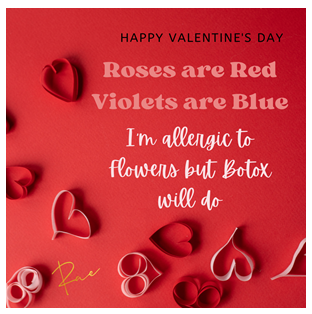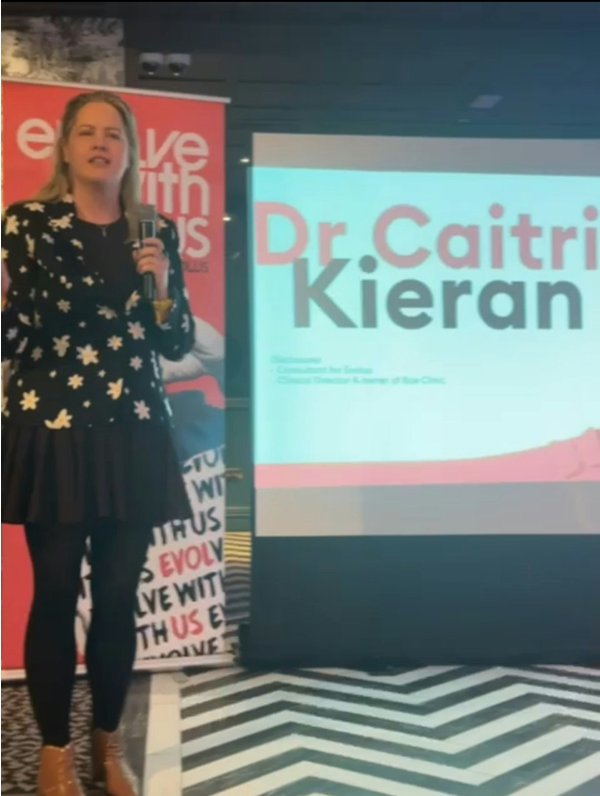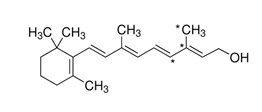Blog: February 2025

Welcome to February. I have a jam-packed newsletter for you, so be sure to scroll right to the end. Sneak-peak, "The science part" is all about retinols this month. If there is a particular topic, you would like me to address, get in touch!
LOVE IS IN THE AIR

Flowers not for you? Vouchers are available 24/7 from our online store. Physical vouchers can be purchased by phone or in clinic and sent by post. These can be redeemed, in clinic against the cost any treatment or product.
Purchase Gift Voucher
What's new this month

Certainly not my best picture, but to date, probably the one I am most proud of. Another one of those pinch me moments. Last week, I was asked to speak on a panel alongside some of the world's leading experts in cosmetic toxins. It leads me to reflect on my journey so far, and how I have made my way to where I am today.
Earlier this week, I saw an Instagram trend that led me to write a short letter to my younger self, to thank her for all the hard work, grit and determination she had, to get me to where I am today.
I dont think I have ever done this before, but it is important to slow down and celebrate life's achievements.
I met my younger self today for coffee.
She had a sugary mocha with a big fruit scone and loads of butter.
I had a skimmed milk cappuccino.
I told her to enjoy all the sugar while she can - it tastes good but you won't like it as much now. You will still only be able to drink 2 coffees a day. That hasn't changed.
She is worried about not being able to sit in the one place long enough to study even though she does well in exams. I explain to her about different ways of learning and that she would find her niche.
I told her with delight that she has an honours degree and not only that; she has completed her membership exams to the Royal College of Surgeons; she has a distinction at MSc. level and after all that, still went on to complete a diploma in dermatology.
I tell her that her thirst for knowledge gets stronger and stronger. That she loves what she is doing, even when it was scary and people tell her to take a safer road.
That her chattiness is now her biggest asset, even though it gave her so many problems in school. People enjoy how it puts them at ease and allows them to understand the complexities of different procedures. That it helps her be a better teacher, and that she loves teaching.
I tell her that she frequently takes a different path, but it's ok. Continue to wear those bright colours and continue to shine.
She asked me if the hard work was worth it.
I told her it won't be an easy ride, but to keep going. It gets harder, but better than she ever imagined.
We hugged, and she asked: "Will it be ok in the end?" I told her: "if it's not ok, it's not the end. Things are only scary until you do them."
I have so much more to tell her, but I had to leave.
We will meet again soon 💛
And now for the science part:
Retinols and Regulations
So what is it and what is all the fuss?
Retinol is a form of Vitamin A. Vitamin A can be found in foods such as eggs, meats and carrots. Retinol can It can also be applied topically (to the skin) using creams or gels, isotretinoin can be ingested in capsule form.

What does it do?
It can increase cell proliferation (production), reduce wrinkles and pigmentation, unblock pores and act as an exfoliant. Its multipurpose function makes it a powerhouse in the world of dermatology and aesthetic medicine.
At low doses, applied to the skin, it can be used safely, with no issues. It is used at high doses, in capsule form, for those suffering from severe acne. Many of you will know the name Roaccutane.
If it is so good, then why is there caution around it?
At very low doses, it is simply ineffective. Higher doses, if applied wrong, too much or too frequently, can cause the skin to burn and then peel - "Retinol Burn". This disrupts the skin's delicate microbiome and protective layer which can take months to repair.
At very high level (usually ingested) it can cause headaches, liver damage, and birth defects in pregnancy.
Are all retinols the same?
No - and this can be the confusing part. The term "retinol" is often used broadly. There is actually a variety of retinoids with different properties.
There is a series of pathways that each undergoes during absorption in the skin. Retinol to retinaldehyde to retinoic acid.
Why might you use one over the other?
Retinoic acid (tretinoin) is the purest form and does not undergo any conversion in the skin. Is this the best? Not always. If you have severe acne, this is brilliant to get it under control, dry up the skin, reduce post inflammatory hyperpigmentation and reduce scaring. On the opposite side of the scale, someone who suffers from eczema - this can cause lasting damage to the barrier function of their skin. Then there is an array of other skin types in between.
Retinaldehyde is next on the conversion scale. It is becoming more common in skin care products. It isn't very stable and can be difficult to formulate which reduces its benefits.
Retinol - this is the one most people will know. With little tweaks to the formulation and application, it can be tailored to suit the needs of most people. Strength, frequency, amount of product, wet and dry skin, before and after moisturiser - these are all different ways I will advise application depending on your needs and lifestyle.
Last part of the puzzle - is 1% retinol in one brand the same as 1% in another brand. The short answer is no. All brands have different formulations - the molecules will be packaged differently. Think of two cars: they may both have a 1.6 Litre engine, but both perform and drive very differently.
The other ingredients in the product may help stabilize the retinol, they may help its absorption into the skin, increase the amount of it which is converted into the active form or help to protect the skin allowing you to use a higher strength than you would otherwise tolerate.
So finally this all leads me to:
The new regulations: Why they are there? What they might mean for you?
Prior to these new regulations, you would commonly have seen retinols of 1% on your shelves. Under the new regulations, the use of retinol, retinyl palmitate and retinyl acetate will only be permitted with a concentration of less than 0.3% in facial products and less than 0.05% in body lotions. In addition to the reduced concentration, products will also be required to display visible warning labels stating, ‘Contains vitamin A-related compounds, which contribute to your daily intake of vitamin A."
A study carried out by the European Union’s Scientific Committee for Consumer Safety (SCCS) found that although the contribution of retinoids from cosmetics to overall vitamin A exposure was low, when combined with exposure to vitamin A from food and dietary supplements, there could be cause for concern.
Back to what was explained above, regarding conversion in the skin, the amount of vitamin A absorbed through the skin when using topical ointments and creams, even at 1% retinol, is negligible. It is very safe.
These new regulations don't apply to food supplements which have much higher doses, so why is skin care targeted?
This is mainly because of the problems of overuse or incorrect use - the "Retinol Burn"
As its popularity has increased, more and more people are using it. Therefore, more and more people are using it incorrectly. It is recommended you start off using the lowest concentration available and slowly building up your tolerance. In the beginning, it should only be used once or twice a week maximum, so you have time to see how your skin reacts and adjust your use accordingly. It’s also important to be generous with your sunscreen application, as skin will be more sensitive to the sun and UV rays. Slow and steady wins the race.
Long-term readers of my newsletters, you will have heard me say before, products that you can pick off the shelf be it for 5 euro on the high-street or 500 euro in a boutique, they all have one thing in common. They have to be of low strength and largely ineffective. This is so anyone, with any level of knowledge or medical condition, can pick up that product and use it safely.
So I hope this explains why 1% retinol can be a problem, although mainly down to individuals using them incorrectly. (We're all human, we don't always read the instructions). There is also issues of minors purchasing the products - younger skin is much more delicate and it can have long-lasting effects - there are very limited circumstances (mainly severe acne) that youths should use retinol, and then the benefits must outweigh the risks.
(A side note on high street products - in terms of affordability - buy one high strength medical grade active serum to suit your needs and then choose more affordable products around that)
So when do these regulations come in?
They will be rolled out over 36 months from the end of 2024. Brands will then have 18 months to cease production and 36 months to withdraw from the marketplace.
Should I stockpile then?
Retinol, like a lot of other skin care products, has an expiry date. Ingredients typically break down after a period of time, even when unopened. Mostly they just become ineffective but a lot of the time they become ineffective and cause skin irritation.
So will I still be able to buy retinol products?
Yes, but how you buy it might change a bit. You won't be able to just pick it off a shelf any more. It will become, in a sense, a prescription item. This may not look any different to you if you are already buying from a registered medical practitioner's clinic. For example - if you come in to me - I can pick it off the shelf and give it to you. What you don't see - I have signed for it with the company on a prescription basis, I have carried out an assessment and I will account for it in your medical notes. Similar to toxin treatment, local anaesthetic or tooth whitening gels to name another few common examples.
So I hope you have found this interesting - I tried to make it as brief and concise as possible. I have linked the legislation for anyone who like some further bedtime reading.
Legislation
Until next month, Rae Clinic
